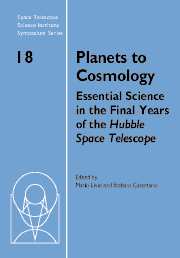 Planets to Cosmology
Planets to Cosmology Published online by Cambridge University Press: 17 August 2009
The study of star formation is currently benefiting from a wealth of new observational data, exploiting the high-sensitivity, wide-field, high-resolution capabilities of a diverse range of space and ground-based instrumentation. In parallel with this, high performance computing is enabling theorists to tackle key problems which—due to their complex geometry and non-linear nature—had long been recognized to be beyond the reach of analytical theory. In this review, rather than reporting progress in each of these areas, I will instead set out some scientific questions that one would expect to be answered before one would regard star formation as a topic that was largely solved. I have accordingly selected three areas: 1) molecular clouds and their relationship to the stars they form and to the wider galactic disk, 2) the question of the determinants of stellar mass (i.e., the IMF), and 3) the issue of protostellar disk dispersal and its relation to planet formation). For each topic, I outline areas of consensus, recent results, and discuss the key problems that can plausibly be addressed in the next five years.
Introduction
In this contribution I have selected three main issues in contemporary star-formation studies. I have chosen these themes because 1) they represent important areas of uncertainty in our current understanding, 2) they involve a synergy between theory and observation, and 3) they span the range of length scales—from planetary to galactic scales—that are involved in different aspects of the star-formation process.
To save this book to your Kindle, first ensure no-reply@cambridge.org is added to your Approved Personal Document E-mail List under your Personal Document Settings on the Manage Your Content and Devices page of your Amazon account. Then enter the ‘name’ part of your Kindle email address below. Find out more about saving to your Kindle.
Note you can select to save to either the @free.kindle.com or @kindle.com variations. ‘@free.kindle.com’ emails are free but can only be saved to your device when it is connected to wi-fi. ‘@kindle.com’ emails can be delivered even when you are not connected to wi-fi, but note that service fees apply.
Find out more about the Kindle Personal Document Service.
To save content items to your account, please confirm that you agree to abide by our usage policies. If this is the first time you use this feature, you will be asked to authorise Cambridge Core to connect with your account. Find out more about saving content to Dropbox.
To save content items to your account, please confirm that you agree to abide by our usage policies. If this is the first time you use this feature, you will be asked to authorise Cambridge Core to connect with your account. Find out more about saving content to Google Drive.